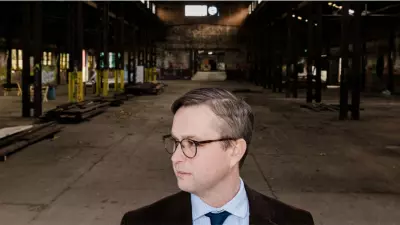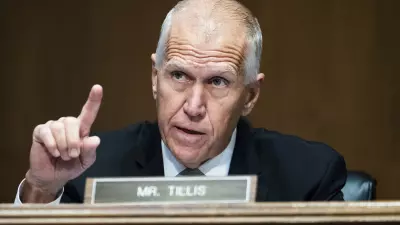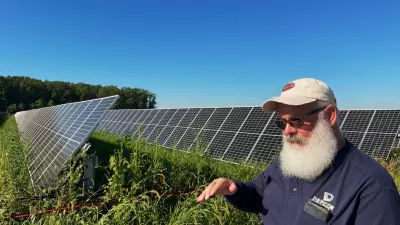HUNTINGTON, W.Va. — A pre-grad-school mission trip, volunteering to fix up homes in Mingo County, changed Brandon Dennison’s life.

“As we were doing our work, these two young guys approached us, came walking down the road, and they had tool belts slung over their shoulders,” said Dennison, who was there with a Presbyterian youth group. “And they asked if we had work available. And I explained that we were just volunteers, and they sort of went on their way.”
Many people in the region were unemployed or underemployed. The interaction, though brief, stuck with Dennison, an eighth-generation West Virginian and now the CEO of Coalfield Development.
“I felt like it summed up the situation in the coal fields of West Virginia, which is that we have people who want to work and want to contribute, who want to be a part of something,” he said.
So, he set about building a nonprofit to help lead a transformation of an industrial economy into something new, founding Coalfield Development in 2010. In September, Coalfield — as part of the Appalachian Climate Technologies Coalition — won a $62.8 million grant package through the federal government’s Build Back Better Regional Challenge to expand the kind of transformations for southern West Virginia that Dennison envisioned.
Coalfield works to create jobs and other opportunities in a state that is second only to Wyoming nationwide in the amount of coal produced at a time when the government is incentivizing less reliance on coal.

Coal-powered electricity generation has been on the decline since its peak in 2007, according to the U.S. Energy Information Administration (EIA). But as of 2021, 15 states, including West Virginia, still rely on coal as their largest source of in-state electricity generation, says an EIA December 2022 report. Pennsylvania and Ohio are among those that have reduced coal reliance in favor of natural gas.
West Virginia, for all its natural, visitor-attracting beauty, struggles with unemployment that is higher than the national average and generational poverty. Nearly 17% of people lived below the poverty level, compared to about 13% nationwide, according to the 2021 Community Survey of the U.S. Census.
Coalfield Development started as a deconstruction company. Instead of just tearing down old buildings and throwing all the material away, Dennison’s plan included salvaging anything reusable. Thirteen years after its founding, the deconstruction work remains a vital part of the organization. But it’s not the only endeavor.
Key to Coalfield’s mission is transforming dilapidated structures into workplaces and creating jobs. A former clothing factory in Huntington is Coalfield’s headquarters and the home for several businesses, both its own and spin-offs.
Called West Edge, the cavernous space houses five businesses, employing 123 people. The enterprises include Mountain Mindful, which up-cycles materials — including salvage from Coalfield’s deconstruction work — into items such as furniture and home décor. Mountain Mindful also creates and sells custom-printed and embroidered clothing made from organic cotton and recycled materials.
“This is a once-in-a-generation opportunity for transformational progress in our communities.” — Brandon Dennison, an eighth-generation West Virginian and CEO of Coalfield Development
West Edge also offers spaces for artists and social, community, and theater events. The electricity contracting firm Solar Holler, with more than 80 employees at West Edge, focuses on designing and installing solar energy systems for homes and businesses in the region.
“It’s so interesting to me to think about West Virginia’s role in the country’s economy,” said Gina Milum, outreach and operations coordinator at West Edge. “We’ve always been an energy-producing state — the coal. Even as our role in the economy is changing, this will help ensure that West Virginia continues to be an energy- producing state. But this will be renewable energy.”
About a two-hour drive southwest of Huntington, Highwall, an organic farm, takes the space once occupied by a mountaintop strip mine.
Raising both plants and animals for food, this agricultural arm of Coalfield sits in a rural area where residents don’t have quick access to fresh food. In 2021, for example, just five stores in Mingo County offered fresh produce, according to WV Foodlink.
Refresh Appalachia, a Coalfield program operating out of West Edge, is collaborating with Highwall and hundreds of other farms to make accessing fresh food easier for residents. This includes working with school districts to increase fresh, local food in cafeterias.
Kaleb Hanshaw, crew chief at Highwall, said the farm also sells directly to consumers and plans to move toward a sales model where customers pre-order the food they’ll need for an entire year.
“The heart of the project is land regeneration,” Hanshaw said. “It used to be a strip mine, and now it has an unbalanced ecosystem.”

Dennison said that although the mining company was required to remediate the land when it left, and did so, “what’s required is fairly minimal and doesn’t have ecological balance as its goal.”
Hanshaw said the goal is to “bring balance to the entire ecosystem. Not just the soil, not just what has been damaged, but to bring back all that used to be here before.”
Coalfield will expand its projects and programs through the federal Build Back Better grant package — one of 21 awarded across the country. The package is supplemented by $26 million in matching non-federal grants. The grants are meant to drive economic activity in distressed regions — areas disadvantaged because of unemployment, poverty, and other factors.
Coalfield was the lead applicant in the coalition, which also includes West Virginia universities, cities, nonprofits, and businesses.
The grant package will support eight projects in 21 southern West Virginia counties, including turning old factories in Charleston and Huntington into business innovation centers.
RePower Appalachia, led jointly by Coalfield and the Central Appalachia Network’s Solar Finance Fund, is another of the eight projects. It plans to expand sustainable energy projects, energy projects, including training for workers to install 750 solar roofs each year. A new fund will incentivize businesses and nonprofits to take part.
“This is a once-in-a-generation opportunity for transformational progress in our communities,” Dennison said.







